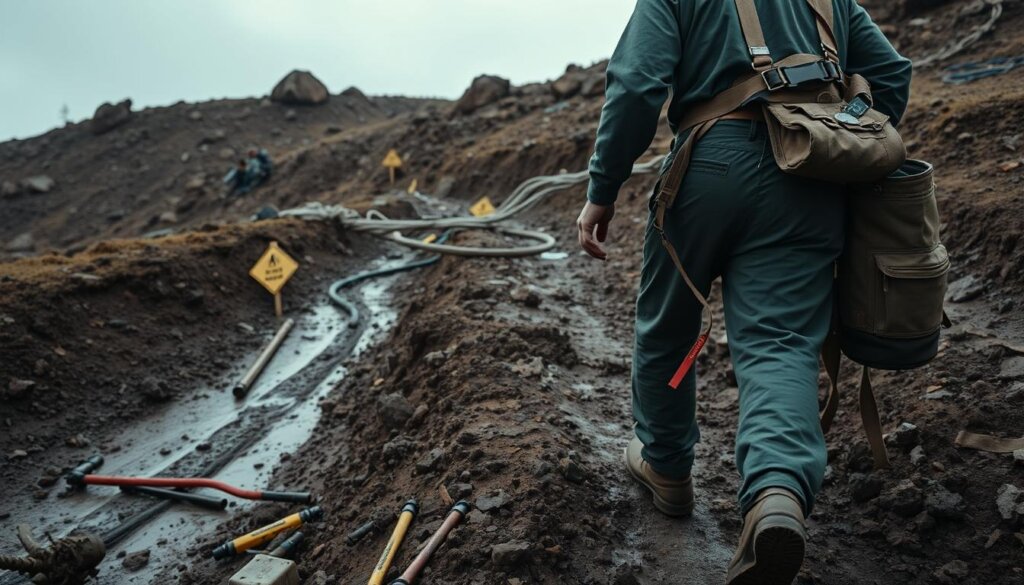Imagine being a field service technician, fixing complex problems at a client’s place. You face tight spaces and unexpected issues every day. But what makes this job so tough?

Key Takeaways
- On-site service calls have unique physical, logistical, and communication challenges for technicians.
- Knowing these challenges is key to better field service efficiency and technician happiness.
- Things like weather, equipment limits, and safety make on-site work more complex.
- Good time management, training, and talking to clients are vital for on-site service success.
- Using technology can make on-site work easier and help technicians.
Understanding the Nature of On-Site Service Call Challenges
Field service technicians face many challenges when dealing with on-location support. They must handle different types of service calls and follow specific industry rules. Understanding these obstacles helps our technicians manage on-site service calls better.
Types of Service Calls
Service calls can be simple or very complex. Technicians need to be ready for anything, from basic maintenance to fixing big equipment problems. Each call has its own set of challenges, requiring technicians to be versatile and quick to adapt.
Common Industry Requirements
Every industry has its own rules that technicians must follow. Knowing these rules is key to solving problems and completing service calls successfully. Our technicians keep up with the latest industry standards to provide top-notch support.
Initial Assessment Protocols
The first step in managing service calls is a thorough initial assessment. Technicians must be skilled at quickly figuring out the problem and what to do next. This step is crucial for solving issues and making customers happy.
Physical Demands and Environmental Factors
Working on-site can be tough. Technicians often have to lift heavy things, like equipment or big parts. They also work in small spaces, like tight closets or crawl spaces, which can be hard on the body.
Field service techs also deal with the weather. It can be very hot or very cold, making simple tasks hard. Working in rain, snow, or strong winds is not only hard but also risky for the tech and their tools.
To overcome these challenges, techs need strength, problem-solving skills, and flexibility. They must be ready to work in different places and adjust their methods. All this while keeping their professionalism and service top-notch.
Time Management and Scheduling Complexities
Managing field service calls is tough. Technicians face many time-related challenges that affect their work. They must deal with busy hours, emergency calls, and travel time. The field service world needs a balance of planning and being flexible.
Peak Hours and Emergency Calls
During busy times, the need for service calls goes up. This creates a long list of requests for technicians. They must also handle sudden emergency calls, which can mess up their plans. Using real-time dispatch and flexible scheduling helps solve these service call difficulties. It ensures quick on-location support for clients.
Travel Time Considerations
Travel time between jobs affects productivity and customer happiness. Things like traffic, weather, and the distance between calls can make travel unpredictable. By planning travel times well and optimizing routes, teams can reduce the impact of travel. This helps them respond faster to service calls.
Buffer Time Management
Adding buffer time between calls is key for flexibility and handling surprises. Issues like complex problems or needing extra parts can make calls longer. This delays the next appointment. With enough buffer time, technicians can handle these on-location support issues better. This ensures a reliable service for customers.

Equipment and Tool Limitations
Equipment and tool limitations can be a big problem for technicians during on-site repairs. These items are often hard to move and maintain, especially in tight spaces. They may need special tools that are hard to find, making the job longer and more frustrating.
Weight and size are major issues with equipment and tools. Heavy or big items are hard to carry, making it tough to get to some areas. This can slow down repairs as technicians have to carefully move the equipment.
Tools also get worn out quickly, needing constant upkeep and replacement. This can really mess up the technician’s work flow.
To solve these problems, technicians need to be creative and resourceful. Using lighter and more portable tools can help a lot. Keeping tools in good shape and organized is also key. Working closely with clients to understand their needs can help prepare the right equipment, reducing problems during visits.
Communication Barriers with Clients
Talking effectively during service calls can be tough. Issues like technical terms, language differences, and managing what clients expect are common. It’s key to overcome these to give great service and solve problems well.
Language and Technical Terms
Our team members come from many places, and not everyone speaks the same language. They also might not know technical words. We need to talk clearly and simply so everyone understands.
By explaining things in a way that’s easy to get, we help our clients. They can then make choices based on what we’ve said.
Expectation Management
People often have certain ideas about when, how much, and what will happen during service calls. It’s important to manage these expectations to keep clients happy and avoid confusion. Our team is trained to set clear expectations, keep clients updated, and answer any questions quickly.
This way, we make sure what clients expect matches what we can do. It helps avoid frustration and makes the experience better for everyone.
Documentation Requirements
Keeping detailed records is a big part of our service call process. Our technicians write down everything about each call, like the problem, how we fixed it, and what to do next. This helps us keep a good record and also helps clients understand what happened.
Safety Considerations and Risk Management
On-site service calls can be risky for field technicians. They face many dangers, from unpredictable environments to dangerous equipment. At FieldAx, we put our technicians’ safety first. We work hard to manage risks and overcome challenges they face.

One big safety issue is physical hazards like slips, trips, and falls. Uneven terrain and cluttered spaces can increase these risks. We train our technicians to stay safe by teaching them how to move around and use protective gear.
Our technicians also deal with chemical, electrical, and mechanical hazards. It’s vital they know how to handle these risks. We give them the tools and training they need to stay safe and do their job well.
Technical Knowledge Requirements
Success in on-site service calls requires a lot of technical knowledge. Field technicians need to keep learning to keep up with new technology. They must master the latest tools and software and improve their problem-solving skills.
Continuous Training Needs
The field service world is always changing. New products and methods come out all the time. Good technicians know they need to keep learning. They go to workshops, take online courses, and practice to stay ready for any repair challenge.
Technology Updates
Staying current with technology is key. Field technicians must learn about new tools and systems. This helps them fix problems fast, keeping clients happy and reducing downtime.
Troubleshooting Skills
Being good at troubleshooting is essential. Technicians need sharp analytical skills and a keen eye for detail. They must be confident in solving complex problems. This way, they can find and fix issues quickly and effectively.
Weather and Seasonal Challenges
Field service pros face big challenges from weather and seasons. Extreme temperatures and unpredictable rain can be tough to deal with. We need to be ready for anything.
Summer heat can hurt both people and machines. It can cause equipment to break down and even be dangerous. In winter, cold weather and snow can mess up our plans and slow us down.
Natural disasters like hurricanes and floods can really mess up our work. They can damage buildings and stop power. Our teams must be quick and safe when dealing with these problems.
At FieldAx, we get how hard weather and seasons can be. We help our clients by planning ahead and using the latest tools. This way, we make sure our clients keep running smoothly, no matter what.
Conclusion
Field service technicians face many challenges on the job. These include the physical demands and communication barriers with clients. These issues can really affect how well they work.
But, with the right tools and strategies, these problems can be solved. FieldAx is a cutting-edge software designed to help. It offers features like real-time scheduling and mobile access.
FieldAx helps field service teams manage their time better. It also improves communication with clients. This way, field service professionals can focus on excellent service, reducing the impact of common challenges.
The field service industry is always changing. It’s important for businesses to keep up and use the latest solutions. By using innovative technologies like FieldAx, field service organizations can stay ahead. They can offer a better customer experience and grow in the long run.
See how FieldAx can transform your Field Operations.
Try it today! Book Demo
You are one click away from your customized FieldAx Demo!
FAQ
What are the most common types of on-site service calls?
On-site service calls vary by industry. They include equipment repair, installation, maintenance, and emergency calls. Each type has its own challenges and needs.
What are some of the industry-specific requirements for on-site service calls?
Each industry has its own rules. For example, HVAC techs must follow strict refrigerant handling rules. IT pros must keep data private and secure.
How do physical demands and environmental factors impact on-site service calls?
Technicians face physical strain from lifting and working in tight spaces. Extreme weather adds to the challenge, causing fatigue and safety risks.
What are some of the time management and scheduling complexities in field service?
Calls can be affected by peak hours and emergencies. Travel time and unexpected issues also play a role. Good scheduling is key to efficient service.
What are the common equipment and tool limitations that technicians face?
Tools must be portable and easy to maintain. Specialized tools can be a challenge. Having the right equipment is crucial for success.
How can communication barriers with clients impact on-site service calls?
Language and technical terms can cause communication issues. Managing client expectations and documentation is also important. Good communication ensures a positive experience.
What are the key safety considerations and risk management strategies for on-site service calls?
Safety risks include physical and environmental hazards. Proper training and safety protocols are vital. They protect technicians and meet industry standards.
What technical knowledge and skills are required for successful on-site service calls?
Technicians need to understand the equipment and systems they work on. They must also be able to troubleshoot and adapt to new tech. Continuous training and strong troubleshooting skills are essential.
How do weather and seasonal changes impact on-site service calls?
Weather can disrupt field service, affecting travel and job site access. Adapting to weather challenges is crucial for maintaining quality service.
Author Bio
Co-Founder & CMO at Merfantz Technologies Pvt Ltd | Marketing Manager for FieldAx Field Service Software | Salesforce All-Star Ranger and Community Contributor | Salesforce Content Creation for Knowledge Sharing






